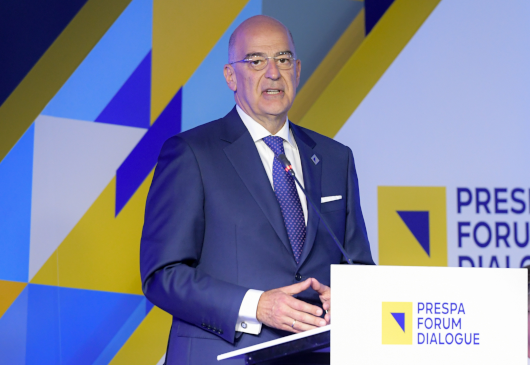It is such a great pleasure to participate at today’s Forum, engaging in the dialogue which provides an opportunity to discuss the challenges and prospects of Western Balkans. Prospects that are linked to the European future of the region. And challenges we can collectively overcome by focusing our efforts on the stability and prosperity of the region. And since there is pessimism sometimes around, may I say, that we do have success stories in the Balkans. And I am here representing one success story: our relation with North Macedonia. 10 years ago, who would have said that the Greek Foreign Minister would come to a foreign policy Forum, the Prespa Forum, and advocate for the European future of North Macedonia. So, we can be optimists. These potentially very risky elements coincide with a set of crises in the wider region linked to economy, energy and food. Crises caused or aggravated by the illegal and unprovoked war in Ukraine. Within this equation, it is impossible to imagine Europe without its Southeastern region. Southeast Europe in general and the Western Balkans in particular have always belonged to Europe. Like other parts of the Continent, the Western Balkans have experienced armed conflicts, that is known. But, geographically, historically, culturally they belong to Europe. Their bitter legacy has left behind, even today, an amount of mistrust, nationalism and lack of reconciliation.In this context, the region’s European integration remains an unfinished business 19 years after the 2003 “Thessaloniki Agenda”. Greece is doing its utmost to contribute to this collective effort. I have recently visited all the capitals of the region to convey messages of support for our partners’ European perspective, as well as to highlight the need for reconciliation. Can I talk now a little bit about our big home, our big family, the European Union. The European Union was created as a visionary project of peace. A project that would promote economic and political integration. And today’s European Union is the outcome of that initial choice. A choice that we, Europeans, need to defend. We should continue to strive tirelessly for cementing peace, stability and sustainable development.The war in Ukraine highlighted the strategic importance of the European Union-Western Balkans relationship. The EU remains the biggest trade and investment partner of the Western Balkans. Cooperation on foreign policy with Western Balkans partners has stepped up, also in relation to Ukraine. Thank you so much. Your Excellencies, Dear Colleagues, Dear Friends,The EU and the Western Balkans should do their own share in this respect. Our partners need to fulfill the relevant criteria according to the set conditionality. But, also, the EU needs to get the enlargement in the Western Balkans back on track and very quickly, if I may say so.As our region tries to endure the impact of war, it is crucial that the EU contributes to this effort. Τhe Economic & Investment Plan is expected to bring tangible benefits to citizens and businesses. It is also expected to reinforce the region’s sustainable growth, including inter-connectivity. However, there are significant positive indications as well. We should all work very closely together, so we can turn the region into a truly European neighborhood. Put this region into the European family where it actually belongs.I would like to conclude with a word of caution regarding the presence of third actors in the region. Actors which promote adversarial political and economic agendas. Such agendas, different to the European agenda, run counter to our collective interests, and they attempt to undermine the EU-Western Balkans relationship.
Your Excellencies, Dear Colleagues, Dear Friends,The EU and the Western Balkans should do their own share in this respect. Our partners need to fulfill the relevant criteria according to the set conditionality. But, also, the EU needs to get the enlargement in the Western Balkans back on track and very quickly, if I may say so.As our region tries to endure the impact of war, it is crucial that the EU contributes to this effort. Τhe Economic & Investment Plan is expected to bring tangible benefits to citizens and businesses. It is also expected to reinforce the region’s sustainable growth, including inter-connectivity. However, there are significant positive indications as well. We should all work very closely together, so we can turn the region into a truly European neighborhood. Put this region into the European family where it actually belongs.I would like to conclude with a word of caution regarding the presence of third actors in the region. Actors which promote adversarial political and economic agendas. Such agendas, different to the European agenda, run counter to our collective interests, and they attempt to undermine the EU-Western Balkans relationship.
Minister of Foreign Affairs Nikos Dendias’ remarks at the “Prespa Forum Dialogue 2022” Session “The European Peace Project in the Western Balkans” (Ohrid, 16.06.2022)
Stay Connected
Must Read
Related News